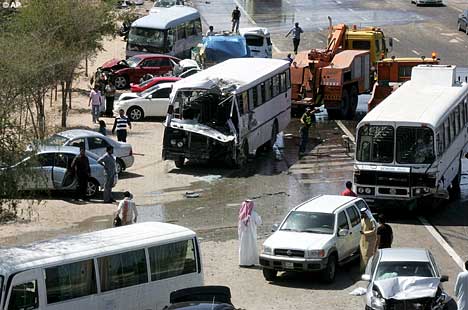TEHRAN: Iranian atomic energy chief Ali Akbar Salehi said on Wednesday that the assassination of a top nuclear scientist was a warning from the West ahead of new talks on Tehran’s program.
"These wicked people wanted to show their hideous side which demonstrates their carrot and stick policy in the run-up to the new nuclear talks," state television’s website quoted Salehi as saying.
He was speaking at the funeral of Majid Shahriari, the scientist who was killed by unidentified bombers in Tehran on Monday.
Salehi did not specify the country he held responsible for the murder but other officials have pointed the finger at Iran’s arch-foes Israel and the United States.
Iran’s chief nuclear negotiator Saeed Jalili, who is to head his country’s delegation to the talks with the major powers in Geneva next week, hit out at Western governments as he joined the mourners.
"They used all the capabilities at their disposal, like passing resolutions, imposing sanctions and piling on political pressure but they did not gain anything," state television’s website quoted him as saying.
"Today they have resorted to assassination, which shows their desperation and the dead end they have reached."
Like hardline President Mahmoud Ahmadinejad on Tuesday, Jalili said that UN Security Council member states shared responsibility for the murder as they had named Iranian nuclear scientists in a blacklist contained in sanctions resolutions.
"This is a big scandal for the UN Security Council, when the terrorists execute its resolution and the list issued by the Council resembles the list the terrorists have," he said.
On Tuesday, Ahmadinejad threatened legal action against the council’s five permanent members — Britain, China, France, Russia and the United States — if there is any further act of violence against Iranian scientists.
"As God is my witness, if this happens again, we will sue each permanent member of the United Nations Security Council," Ahmadinejad said.
"You are wrong. We attribute these crimes to those who passed the resolution against us, since they mentioned the names of our scientists in it."
Shahriari was not on the blacklist but another nuclear scientist, Fereydoon Abbasi Davani, who was wounded in a second bomb attack on Tuesday, was named in UN Security Council Resolution 1747, which the Security Council adopted in March 2007.
Ahmadinejad said on Wednesday that if next week’s talks are to be productive, Western governments need to adopt a more constructive approach.
"Now they are saying they want to negotiate. We have said repeatedly that we have always been in favour of talks based on logic, law and justice," the Mehr news agency quoted him as saying.
"But they should know that if they want to bully, then the negotiations will not produce any results."
Jalili said that the talks, which are to be fronted by the European Union’s chief diplomat Catherine Ashton on December 6 and 7, need to be on the basis of three core principles set by Iran.
"These are fundamental questions which have to be answered in the talks and we are seeking those answers," he said.
He was referring to three conditions set by Iran for the talks — that they be based on "engagement and cooperation," that world powers not resort to threats and pressure, and that the issue of Israel’s undeclared but widely suspected nuclear arsenal be up for discussion.

